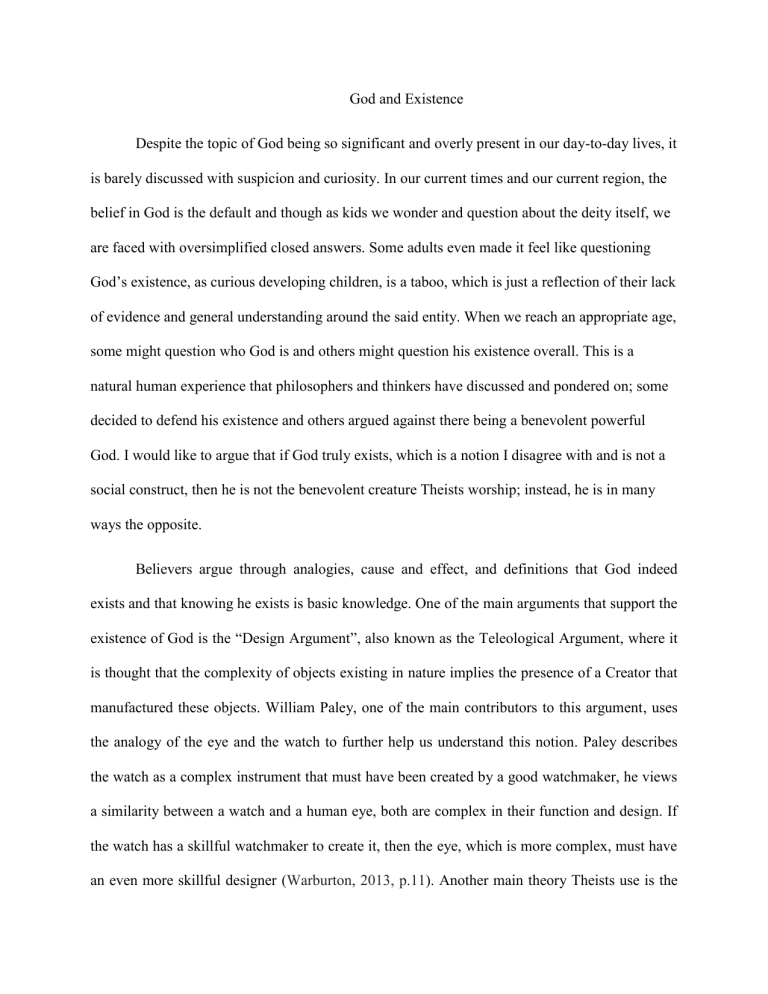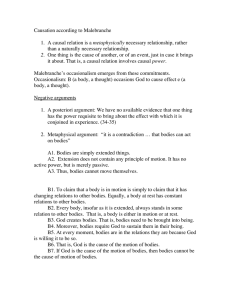
God and Existence Despite the topic of God being so significant and overly present in our day-to-day lives, it is barely discussed with suspicion and curiosity. In our current times and our current region, the belief in God is the default and though as kids we wonder and question about the deity itself, we are faced with oversimplified closed answers. Some adults even made it feel like questioning God’s existence, as curious developing children, is a taboo, which is just a reflection of their lack of evidence and general understanding around the said entity. When we reach an appropriate age, some might question who God is and others might question his existence overall. This is a natural human experience that philosophers and thinkers have discussed and pondered on; some decided to defend his existence and others argued against there being a benevolent powerful God. I would like to argue that if God truly exists, which is a notion I disagree with and is not a social construct, then he is not the benevolent creature Theists worship; instead, he is in many ways the opposite. Believers argue through analogies, cause and effect, and definitions that God indeed exists and that knowing he exists is basic knowledge. One of the main arguments that support the existence of God is the “Design Argument”, also known as the Teleological Argument, where it is thought that the complexity of objects existing in nature implies the presence of a Creator that manufactured these objects. William Paley, one of the main contributors to this argument, uses the analogy of the eye and the watch to further help us understand this notion. Paley describes the watch as a complex instrument that must have been created by a good watchmaker, he views a similarity between a watch and a human eye, both are complex in their function and design. If the watch has a skillful watchmaker to create it, then the eye, which is more complex, must have an even more skillful designer (Warburton, 2013, p.11). Another main theory Theists use is the First Cause theory that relies on the idea that nothing exists without a cause. The universe is a series of cause and effect, if we were to go back to the causes that resulted in our being right now, God would be the reason for the first cause to occur (Warburton, p.16). Moreover, another argument, which is not based on proof as to the last two, is the Ontological argument which is supported by the likes of Renee Descartes. The argument explains that God exists based on his definition of being a “perfect being”. God, who is considered perfect, must include existence as part of his perfection (Warburton, 2013, p.18). Descartes found it difficult to find proof of God in the real world, so he relied on the idea of God which, in his opinion, exists inside him. His mind being limited and finite could not possibly produce an image of the perfect being, so he believes that God planted the idea of his existence in us (Cottingham, 2008, p. 351). However, what I find evidently unconvincing in believers' arguments is the lack of solid logical ground, for if Descartes is right and God is a “perfect being” then how come all his creations are heavily flawed? Scholars also have heavily criticized Theist arguments that try to prove the existence of God. The design argument has faced the most criticism, for the analogy used is weak. To imply that the human eye is similar to the clock means they must have a similar function, which they do not, thus the conclusion made is weak as well. David Hume explains that “the similarity between the universe and a product of human design such as a house is very thin” (Cottingham, 2008, p 365). The first cause theory, on the other hand, was accused of contradicting itself; critics argue that assuming there was a first cause for the universe implies there is an end effect where nothing happens after it. And if God is a cause and all causes were preceded by other causes, then why does God not have a cause? This makes the notion hypocritical for stating that everything is caused by something except for God (Warburton, 2013, p.16). Lastly, the Ontological argument received criticism for its absurdity in trying to define all ideas into existence. God, as an idea, being perfect does not mean he exists, his existence itself should not be a property or characteristic like his so-called perfection or benevolence, but it should be a prerequisite to having a characteristic. Other ideas about mythical creatures do have characteristics despite said creatures not existing, that are because if it were to exist it is thought of having these imagined properties that were decided upon by man, this does not mean that mythical creatures exist just because we decided on their properties (Warburton, 2013, p.16). We notice that all theist arguments mentioned have one common criticism. Even if all the theories are true and God does exist, there is no proof that he exists in the same way described by believers in Abrahamic religions. God is seen as benevolent, all-knowing, and capable of everything, yet none of the arguments supporting his existence prove these characteristics. So, God's existence could be irrelevant in these cases because he could be a completely different kind of entity, his existence would not prove his goodness. In this sense, we have yet to discuss the most important criticism, which is the “Problem of Evil”. This argument is an idea adopted by many atheists to justify their disbelief. As mentioned, the existence of God does not equate to him having a benevolent kind nature, for if he was so kind then why would there be so much evil in the world. In all its forms, whether human or metaphysical, evil is an undeniable presence in the world we live in, and philosophers argue that in a world ruled by a benevolent God evil should not exist. Natural evil specifically, which is not the product of human nature yet harms humans and causes them severe torment, could be controlled by God to avoid this suffering, yet it happens constantly. It is also said, that if God is all-knowing, he must know when evil is going to happen and be able to stop it. This concept is also criticized by some explaining that evil in the world is justified, so heroes and martyrs can show their good morals. It is also exclaimed that evil is proof of our free will, without it we would be robots programmed by God only doing good things, and that a free world is better even if the price to pay is agony. Furthermore, some would say that in order for the world to be harmonious, Good and Evil must exist, just as black and white exist in a painting, as an aesthetic choice. In general, critics of the “Problem of Evil” justify human agony in the name of greater more complex notions such as harmony, good morals, and free will. However, it is important to ask, again, if a great degree of suffering is worth measuring nobility or enjoying presumed free will or worse if it is merely for the enjoyment of God in his perspective of beauty and harmony. One can also say that all these things may exist in a world governed by an allmighty God that sets his own rules, but if God chose the put human suffering as one of the conditions of being alive, then he should not be viewed as good or idolized and worshipped (Warburton, 2013, p.22-25). God’s existence as a whole is something many don’t believe in the first place. People tend to thrive on learning and giving background to the unknown, whether it’s logical or not, in order to comfort their fear of death, which is where “God” as a concept reigns. This fear of both the death and the unknown leads people to seek reasoning for un-explainable issues through “God”. An example of this is the given term “act of God” when describing a natural disaster. This is why it is plausible that many versions of the “Gods” people idolize are nothing but a social construct created to feel better about their lack of knowledge of what the world truly is like. Another argument supporting the idea of God being a social construct is in the different meanings and conceptualizations different cultures have given God to fit their needs and backgrounds. Wouldn’t that mean that God is not entirely real, but rather a construct created in order for people to find a reason to live? In conclusion, to study and analyze elements of God’s existence, or lack of, we need to find a set meaning and definition of what “God” truly means. Essentially, people around the world have different meanings and views on this entity; some see it as a non-physical universal and mystical entity governing the universe as a whole, others view him as a human-like figure, and so on. It is also evident the difference of meanings and perceptions of God throughout different cultures which could reflect bias and the lack of uniform associated with him. Additionally, the studies around God should not be limited to only his existence or lack thereof, but to the real characteristics of this presumed powerful being that chooses to watch our constant suffering. God not existing could be better than him existing in this state of neutrality against his creations’ agony. References: Cottingham, J. (2008). Western Philosophy: An Anthology (2nd Edition.). Blackwell Publishing. Warburton, N. (2013). Philosophy: The Basics (5th Edition.). London and New York: Routledge.



